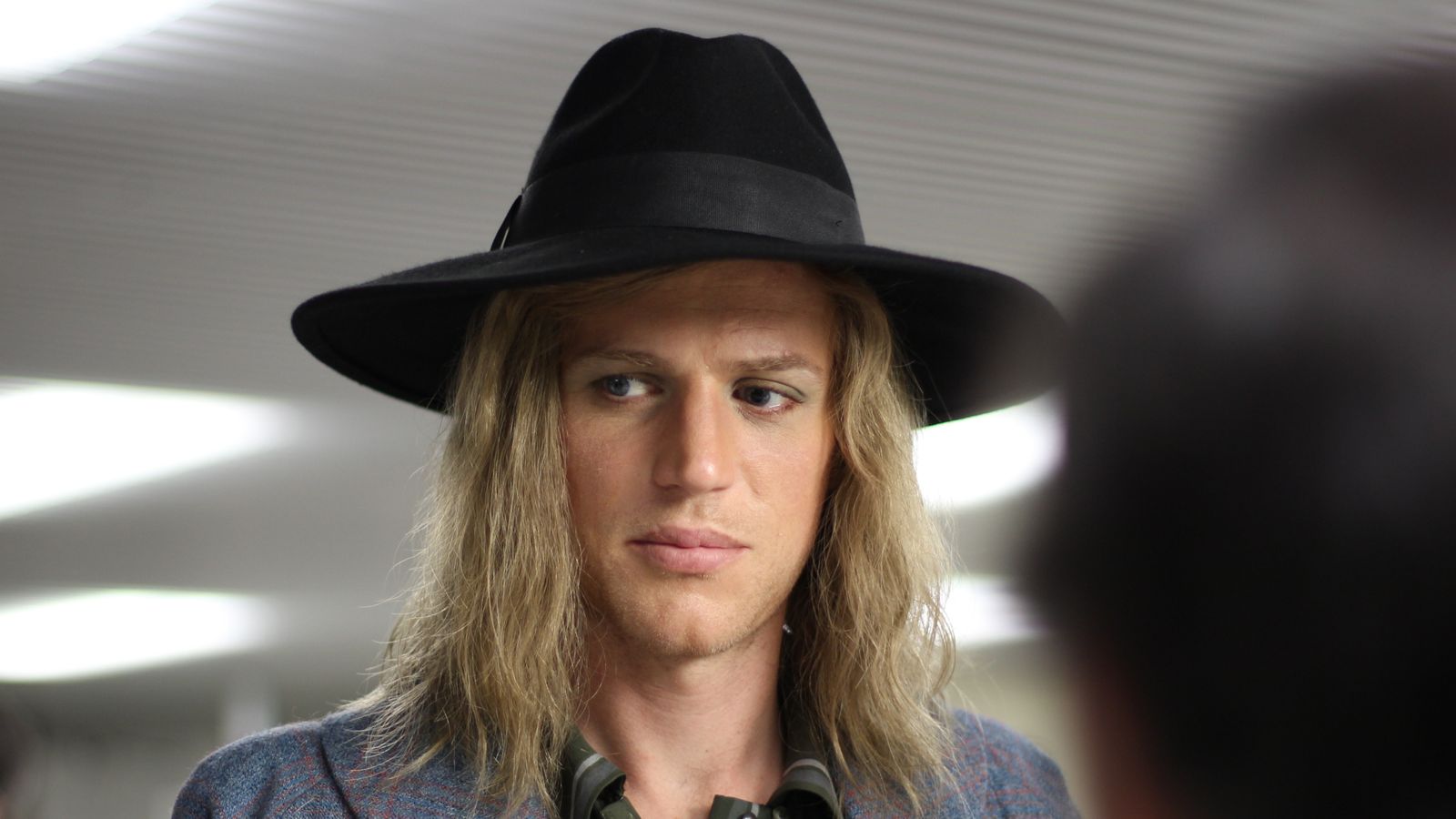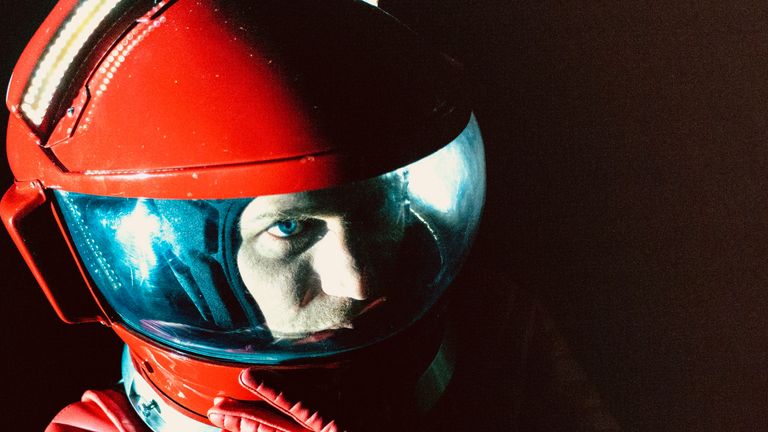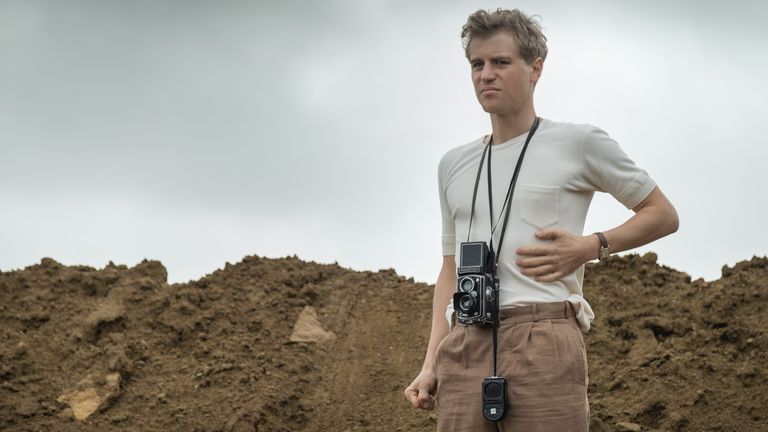It’s not easy taking on the role of an iconic celebrity beloved by millions, and it’s a job made even harder when that celebrity’s estate hasn’t given you their blessing.
That’s what Johnny Flynn is doing with his new film Stardust, about David Bowie’s first road-trip around America in 1971 – just before he creates his Ziggy Stardust alter ego and hits mega stardom.
The film was made without the permission of Bowie’s family, and without access to use any of his music.
However, Flynn told the Sky News Backstage podcast that this wasn’t necessarily a bad thing.
“The truth is the estate, as far as I know, they haven’t tried to stop the film being made or objected to it in particular, it’s just that Duncan [Bowie’s son] was asked by journalists when we went into production about the film, a film about his dad, and he said, ‘well, they’re not doing it with his music’, which is nothing but the truth.
“He wasn’t condemning it necessarily, but people have taken an inference from what he said and now said that this film shouldn’t exist.
“The family is absolutely entitled to feel what they feel, but I think the fact that other people jump on the idea that the film shouldn’t exist is a sort of dangerous aspect of cancel culture.”
Flynn is referring to a tweet posted by Bowie’s son Duncan Jones in January 2019, where the 49-year-old film producer wrote about the forthcoming film: “As it stands, this movie won’t have any of dads music in it, & I can’t imagine that changing. If you want to see a biopic without his music or the families blessing, that’s up to the audience.”
Far from being perturbed by the tweet, Flynn says that making the movie without collaborating with Bowie’s family allowed the filmmakers to work without restrictions, and believes the finished picture is all the better for it.
“I think you could argue that this story told with the complicit cooperation of an estate would mean that it becomes a homogenised, slightly, sort of suppressed version of the story, and with all due respect to the Bowie estate and family, we just wanted to be able to tell the story that we wanted to tell.
“All too often we’ve seen with musician biopics and other biopics recently that eventually things just become, I think, a bit bland and safe because of the estate, trying to kind of protect the legacy of the subject.”
:: Subscribe to the Backstage podcast on Apple Podcasts, Google Podcasts, Spotify, Spreaker
Over the last few years, we’ve seen several big-budget, glossy biographies – including Elton John’s Rocketman and Queen’s Bohemian Rhapsody – which have been produced in close collaboration with the talent they are scrutinising.
While that gives unprecedented access to first-hand memories and experience, it can also stifle objective view and allow any less than glamorous or positive aspects of the subject’s history magically disappear from view.
While Stardust explores Bowie’s transformation into a star, it also analyses his relationship with his older half-brother Terry, who was diagnosed with schizophrenia and spent the last part of his life in a mental health institution.
We see Bowie struggling to come to terms with his brother’s ill health, while at the same time juggling his own fears of developing mental health issues.
While Flynn says it was a journey he eventually enjoyed, he admits that even he wasn’t initially convinced by the film.
He turned down the role when he was first offered it, not because the estate wasn’t on board or because of the focus on the star’s family history, but because Bowie is such an intimidating character to take on.
However, by documenting a moment in Bowie’s past that was a low-point – before the musician created Ziggy Stardust and shot to worldwide fame – the film presents a Bowie that isn’t well-known or universally adored.
Flynn said that helped him inhabit the role: “It’s scary, but then also, once I committed to doing it, I really just tried to treat it like any other role or character.
“The thing that swung it for me and made me want to do it was realising that this is this tiny moment in David’s life before he’s well known and it’s a time before people really knew who he was or had an impression of him, in a sense this is his true self, because after 1972, he started creating these different kind of personas.
“This [film] is imagining who David was before that and looking at what made him so vulnerable in this time, so once I looked into it and started researching, I realised this is not as scary as I thought.”
It’s a busy time for Flynn, who alongside juggling home-schooling his three children with his wife, has a second movie coming out this month – The Dig – starring Carey Mulligan, Lily James and Ralph Fiennes.
The Netflix historical drama is based on the 1939 discovery of an Anglo-Saxon ghost ship and numerous hidden treasures in farming land in Sutton Hoo, Sussex.
While lockdowns across the UK mean neither Stardust or The Dig will get their planned cinema release, Flynn says it’s not necessarily terrible timing for the films to come out now.
“I think in lots of ways these slightly smaller films might have more space to be seen and be heard at a time when a lot of the big cinema blockbusters are being held back.
“Something that I’ve learnt is that, you know, there’s a lot of maybe more interesting films landing on the small screen now that are coming out because and getting a bigger release schedule because of the lack of James Bond or whatever.
“So, you know, there’s pluses and minuses.”
Stardust is out on digital platforms in the UK now and The Dig premieres on Netflix on Friday, 29 January.




